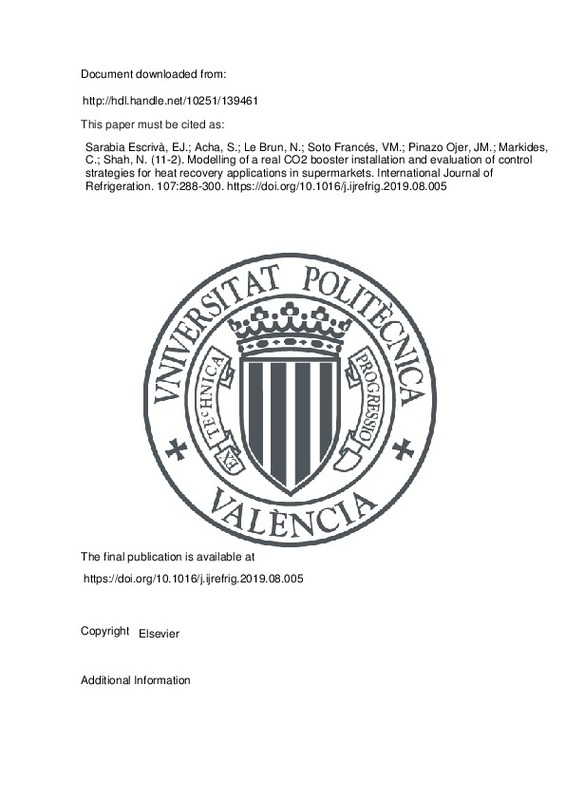JavaScript is disabled for your browser. Some features of this site may not work without it.
Buscar en RiuNet
Listar
Mi cuenta
Estadísticas
Ayuda RiuNet
Admin. UPV
Modelling of a real CO2 booster installation and evaluation of control strategies for heat recovery applications in supermarkets
Mostrar el registro sencillo del ítem
Ficheros en el ítem
| dc.contributor.author | Sarabia Escrivà, Emilio José
|
es_ES |
| dc.contributor.author | Acha, S.
|
es_ES |
| dc.contributor.author | Le Brun, N.
|
es_ES |
| dc.contributor.author | Soto Francés, Víctor Manuel
|
es_ES |
| dc.contributor.author | Pinazo Ojer, José Manuel
|
es_ES |
| dc.contributor.author | Markides, C.
|
es_ES |
| dc.contributor.author | Shah, N.
|
es_ES |
| dc.date.accessioned | 2020-03-26T06:39:32Z | |
| dc.date.available | 2020-03-26T06:39:32Z | |
| dc.date.issued | 2019-11 | es_ES |
| dc.identifier.issn | 0140-7007 | es_ES |
| dc.identifier.uri | http://hdl.handle.net/10251/139461 | |
| dc.description.abstract | [EN] This paper compares and quantifies the energy, environmental and economic benefits of various control strategies recovering heat from a CO2 booster system in a supermarket for space heating with the purpose of understanding its potential for displacing natural gas fuelled boilers. A theoretical steady-state model that simulates the behaviour of the CO2 system is developed and validated against field measurements obtained from an existing refrigeration system in a food-retail building located in the United Kingdom. Five heat recovery strategies are analysed by modifying the mass flow and pressure level in the condenser. The model shows that a reduction of 48% in natural-gas consumption is feasible by the installation of a de-superheater and without applying any advanced operating strategy. However, the CO2 system can fully supply the entire space-heating requirements by adopting alternative control strategies, albeit by penalising the coefficient of performance (COP) of the compressor. Results show that the best energy strategy can reduce total consumption by 32%, while the best economic strategy can reduce costs by 6%. Findings from this work suggest that heat recovery systems can bring substantial benefits to improve the overall efficiency of energy-intensive buildings; nevertheless trade-offs need to be carefully considered and analysed on a site by site basis before embarking on such initiatives. | es_ES |
| dc.description.sponsorship | This research was supported by funds provided via the Imperial-Sainsbury's Supermarkets Ltd. partnership. This work also was supported by the UK Engineering and Physical Sciences Research Council (EPSRC) [grant number EP/P004709/1]. Emilio J. Sarabia gratefully acknowledges financial support from Universitat Politecnica de Valencia Fellowship. Data supporting this publication can be obtained on request from cep-lab@imperial.ac.uk | es_ES |
| dc.language | Inglés | es_ES |
| dc.publisher | Elsevier | es_ES |
| dc.relation.ispartof | International Journal of Refrigeration | es_ES |
| dc.rights | Reserva de todos los derechos | es_ES |
| dc.subject | Food retail | es_ES |
| dc.subject | Energy saving | es_ES |
| dc.subject | Transcritical R744 refrigeration | es_ES |
| dc.subject | Commercial refrigeration | es_ES |
| dc.subject | Heat recovery | es_ES |
| dc.subject.classification | MAQUINAS Y MOTORES TERMICOS | es_ES |
| dc.title | Modelling of a real CO2 booster installation and evaluation of control strategies for heat recovery applications in supermarkets | es_ES |
| dc.type | Artículo | es_ES |
| dc.identifier.doi | 10.1016/j.ijrefrig.2019.08.005 | es_ES |
| dc.relation.projectID | info:eu-repo/grantAgreement/UKRI//EP%2FP004709%2F1/GB/Energy-Use Minimisation via High Performance Heat-Power-Cooling Conversion and Integration: A Holistic Molecules to Technologies to Systems Approach/ | es_ES |
| dc.rights.accessRights | Abierto | es_ES |
| dc.contributor.affiliation | Universitat Politècnica de València. Departamento de Termodinámica Aplicada - Departament de Termodinàmica Aplicada | es_ES |
| dc.description.bibliographicCitation | Sarabia Escrivà, EJ.; Acha, S.; Le Brun, N.; Soto Francés, VM.; Pinazo Ojer, JM.; Markides, C.; Shah, N. (2019). Modelling of a real CO2 booster installation and evaluation of control strategies for heat recovery applications in supermarkets. International Journal of Refrigeration. 107:288-300. https://doi.org/10.1016/j.ijrefrig.2019.08.005 | es_ES |
| dc.description.accrualMethod | S | es_ES |
| dc.relation.publisherversion | https://doi.org/10.1016/j.ijrefrig.2019.08.005 | es_ES |
| dc.description.upvformatpinicio | 288 | es_ES |
| dc.description.upvformatpfin | 300 | es_ES |
| dc.type.version | info:eu-repo/semantics/publishedVersion | es_ES |
| dc.description.volume | 107 | es_ES |
| dc.relation.pasarela | S\393203 | es_ES |
| dc.contributor.funder | Engineering and Physical Sciences Research Council, Reino Unido | es_ES |
| dc.contributor.funder | UK Research and Innovation | es_ES |







![[Cerrado]](/themes/UPV/images/candado.png)

